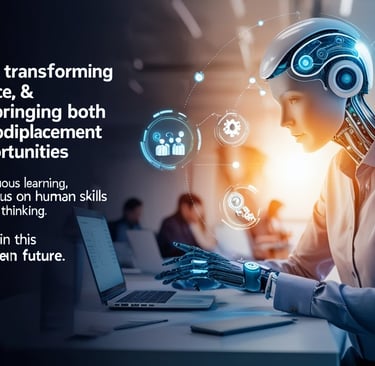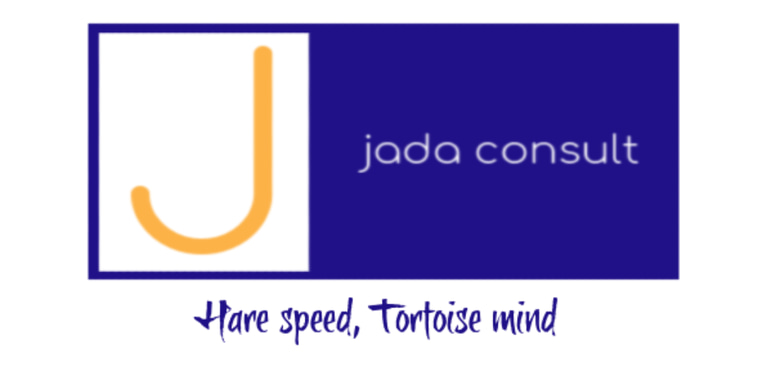AI: Jobs, Skills, and the Future of Work
AI is rapidly transforming the workplace, bringing both job displacement & new opportunities. It demands continuous learning, upskilling, and a focus on human skills such as creativity and critical thinking. Adapt to thrive in this evolving AI-driven future.
CORPORATE
6/5/20255 min read


Is AI Taking Our Jobs?
Artificial Intelligence (AI) is no longer a distant vision of the future; it’s now a powerful force reshaping our workplaces, economies, and daily routines. As AI systems become more advanced and integrated into various aspects of our lives, from customer service to creative industries, a question is on everyone’s mind: Is AI taking our jobs? The answer is nuanced, involving both the loss and creation of employment, a shift in the skills we need, and profound changes to how we work and live.
The Current Impact of AI on Jobs
AI is transforming industries at a pace few could have predicted. From chatbots handling customer inquiries to algorithms managing logistics and even generating creative content, AI is automating tasks that were once considered the exclusive domain of humans. Many businesses are adopting AI to streamline operations, reduce costs, and increase efficiency.
This shift is most noticeable in roles that involve routine, repetitive tasks. Administrative assistants, data entry clerks, and even some customer service representatives are seeing their roles change or disappear as AI takes over. In creative fields, AI can now generate articles, edit photos, and even compose music, challenging the idea that creativity is uniquely human.
However, the impact is not the same for everyone. Entry-level workers and those in roles with a high degree of repetition are feeling the effects most acutely. Some employees are concerned about job security, while others are finding that AI tools make their jobs easier, allowing them to focus on more meaningful or complex work.
Sectors Most at Risk
Not all jobs are equally vulnerable to automation. The roles most at risk are those that involve predictable, repetitive tasks that can be broken down into clear instructions. These include:
· Administrative and Clerical Work: Scheduling, data entry, and basic bookkeeping are increasingly handled by AI-powered software.
· Customer Service: Chatbots and virtual assistants are now capable of answering common questions and resolving basic queries, reducing the need for human agents.
· Writing and Content Creation: AI tools can generate news articles, marketing copies, and even creative stories, impacting writers, editors, and content creators.
· Photography and Design: Automated editing tools and image generators are transforming the way creative professionals work.
· Software Development: AI can now write code, test software, and detect bugs affecting entry-level programming jobs.
Entry-level roles, which have traditionally served as stepping stones for young professionals, are also at risk. As AI takes over more basic job functions, it may become increasingly difficult for new entrants to gain experience and advance up the career ladder.
On the other hand, jobs that require complex human interaction, critical thinking, or hands-on skills are less likely to be automated in the near future. These include:
· Healthcare: Doctors, nurses, and caregivers rely on empathy, judgment, and physical presence.
· Skilled Trades: Electricians, plumbers, and mechanics perform tasks that are difficult for machines to replicate.
· Law and Counselling: Legal professionals and therapists use nuanced reasoning and interpersonal skills.
· Education: Teachers and trainers tailor their approach to meet the unique needs of each student.
The Flip Side: AI Creating New Opportunities
While AI is automating some jobs, it’s also creating new ones. As businesses adopt AI, they need people to develop, manage, and maintain these systems. New roles are emerging in AI training, data analysis, machine learning engineering, and human-AI collaboration.
Artificial intelligence (AI) is also boosting productivity in many industries. Workers who can leverage AI tools often find themselves in higher demand and able to command better wages. For example, marketers who utilise AI for data analysis can create more targeted campaigns, while designers who employ AI-powered tools can produce high-quality work more efficiently.
Moreover, AI is democratising access to certain skills and professions. With the help of AI, people can create music, design graphics, or analyse data without years of specialised training. This opens up new opportunities for entrepreneurship and innovation.
The rise of AI is also leading to the emergence of entirely new industries, including AI ethics, algorithm auditing, and digital well-being. As society grapples with the implications of AI, experts in these fields are becoming increasingly valuable.
The Skills Gap and the Need for Reskilling
As AI changes the nature of work, the skills employers are looking for are evolving rapidly. Digital literacy, creativity, problem-solving, and interpersonal abilities are becoming more critical than ever. Traditional educational paths are giving way to skills-based hiring, where what you can do matters more than the degrees you hold.
I believe that to remain relevant, workers must continually pursue lifelong learning. Upskilling and reskilling are not just buzzwords—they’re essential strategies for navigating an AI-driven job market. This means learning how to utilise new technologies, adapting to evolving workflows, and cultivating the uniquely human skills that AI cannot easily replicate.
Employers, too, have a role to play. By investing in employee training and fostering a culture of continuous learning, they can help their workforce adapt to new challenges and capitalise on emerging opportunities.
Societal and Economic Implications
The impact of AI isn’t limited to individual jobs—it’s reshaping society and the economy as a whole. The reduction in entry-level roles and the ability to outsource work globally may widen inequality and limit opportunities for social mobility. Certain groups, such as women and younger workers, may face greater challenges in adapting to these changes.
There are also environmental considerations. The energy required to power AI systems is substantial, raising concerns about sustainability and the environmental impact of widespread AI adoption.
Society must also consider how to support those affected by automation. This could mean rethinking education, providing social safety nets, and ensuring everyone has access to the training needed for the jobs of the future. The transition to an AI-powered economy will require collaboration between governments, businesses, and workers to ensure that no one is left behind.
Navigating the Future: Strategies for Workers and Employers
So, how can we prepare for an AI-driven world?
· For Workers: Focus on adaptability, creativity, and continuous learning. Embrace technology as a tool to enhance your work, not as a threat. Develop skills that complement AI, such as emotional intelligence, critical thinking, and complex problem-solving.
· For Employers: Strike a balance between automation and investment in human talent. Foster a culture that welcomes new technology while supporting employee growth. Offer training and development opportunities to help workers transition to new roles.
· For Society: Work together to ensure a fair and inclusive transition. Support policies that promote education, training, and social protection. Encourage dialogue among all stakeholders to address the challenges and opportunities presented by AI.
AI is not simply taking jobs, it’s transforming them. The future of work will be shaped by how well we adapt, reskill, and collaborate with technology.
Conclusion
Artificial intelligence (AI) is undeniably changing the job landscape. While some roles are being automated, new opportunities are emerging for those who are prepared to evolve. The story is not one of simple loss, but of transformation and potential. The key to thriving in this new era is adaptability, a willingness to learn, and a collaborative approach to working alongside intelligent machines.
The question is not just whether AI is taking our jobs, but how we can shape the future of work together. By embracing change, investing in skills, and working collaboratively, we can ensure that AI becomes a tool for progress and prosperity, rather than a source of fear and uncertainty.
We create the future through each job, skill, and innovation.
Innovative
Leading AI strategies and robust architectural frameworks.
Solutions
Consulting ENQUIRY
clientservices@jadaconsult.co.uk
+44 01908 032996
© 2024. All rights reserved.


Our privacy policy is here : Privacy Policy: Data Protection & User Rights | JaDa Consult Ltd
